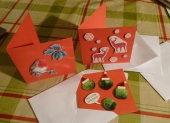





Anne Miller wrote:
William Bronson wrote: Frozen cider makes Applejack, a shelf stable product.
How does freezing cider turn into Apple Jack?
Inquiring mind want to know ....
The name applejack derives from the traditional method of producing the drink, jacking, which is the process of freezing fermented cider and then removing the ice, increasing the alcohol content.[1] Cider produced after the fall harvest was left outside during the winter.
https://en.wikipedia.org/wiki/Applejack_(drink)
Schatzi Hall wrote:Has anyone canned cider. I don’t want to use plastic. Any ideas to freeze cider NOT in plastic. I have around 20 gallons.